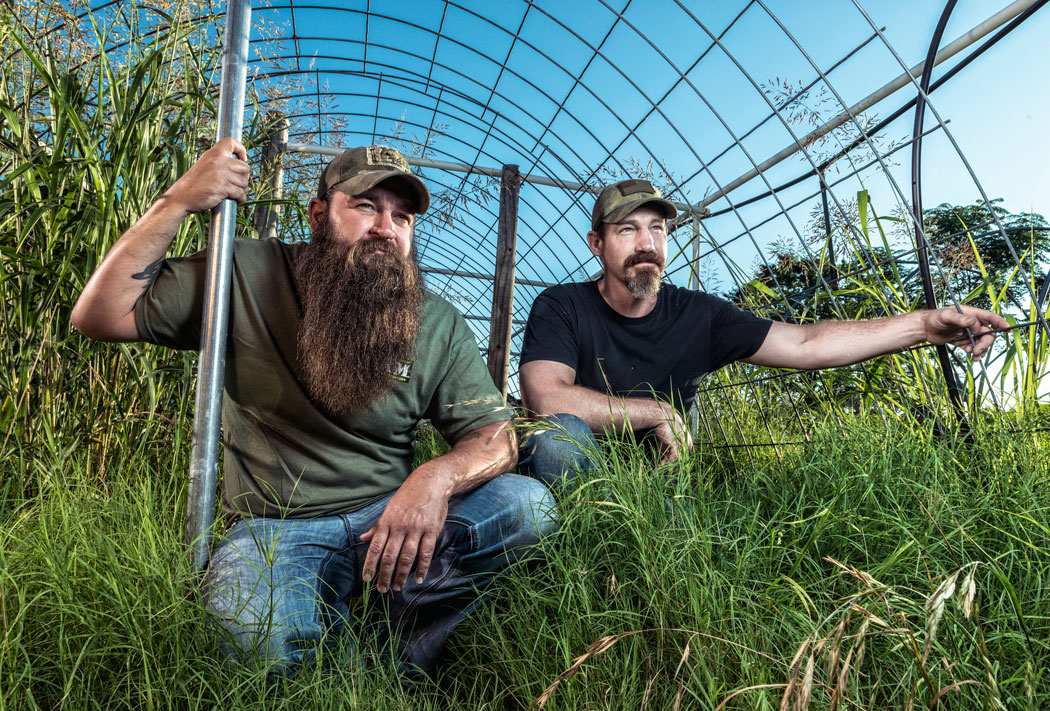
James Jeffers and Steve Smith: Photo by Danny Fulgencio
The farming dreams of Steve Smith and James Jeffers started in their own Oak Cliff front yards. The U.S. Army veterans started Eat The Yard after planting vegetable gardens for their own organic diets.
The nonprofit company now grows organic veggies and flowers for some of the city’s best restaurants, including Bolsa, and it recaptures compost from those restaurants to help them grow more good stuff.
But the dream is bigger than that. Eat The Yard aims to create a sustainable farm where military veterans can live and work. And they’re making plans for a sustainable demonstration farm on what currently is a parking lot near the Dallas Farmers Market.
A farm for veterans
Eat The Yard recently relocated their operation from Oak Cliff to a 17-acre farm in DeSoto. They took it over from missionaries who had let the fields go to seed and the aquaponics systems fall into disrepair. It is a lot of work, but they have a handle on it.
The tilapia they raise provide fertilizer for the fields. The chickens scratch at compost piles to turn it. The hogs turn up the land to prepare it for future planting. They know what they’re doing, and they didn’t need an agriculture degree from Texas A&M University to figure it out.
“We just watch YouTube videos,” Smith says.
It’s funny, but it’s true. They also read as much as they can about farming and attend conferences to learn tricks of the trade.
Smith and Jeffers went through basic training at Fort Hood together and became reacquainted years later in Iraq. They stayed in touch after each was medically discharged — Smith following a terrible Humvee accident and Jeffers following severe combat injuries.
Adjusting to civilian life is one of the toughest parts of leaving the military, they say. An estimated 22 military veterans commit suicide every day. Smith and Jeffers say that upon their return to civilian life, they needed to do something to survive, to find the new normal, and it had to be something meaningful.
“You’ll rarely find anything in the civilian world that would push you that hard,” Jeffers says.
First they used their construction skills to flip houses, but then the real estate market soured.
Smith started planting vegetables in his front yard after taking on an all-organic diet. Vaccinations against anthrax attacks had left both men with digestive trouble. So Jeffers started growing, too. At first, they thought they might start a landscaping business installing edible gardens.
But once they started turning dirt, pulling weeds and watching things grow, they realized how profoundly therapeutic gardening can be.
After losing two friends to suicide, they went all in on Eat The Yard. Smith still owns and operates his foundation repair business fulltime and works for Eat The Yard about two hours a day. Jeffers works fulltime for the nonprofit.
They so far haven’t been able to pay a staff, but they have about a dozen volunteers, most of them vets.
Doing farm work is meditative, Jeffers says. It’s a distraction from what’s going on inside a person’s head. Once veterans start doing mundane farming tasks such as pulling weeds, they start talking about their trauma, and they don’t even realize it.
“Farming is the fun part,” Jeffers says. “It’s healing.”
A farm for the city
Eat The Farm is working on a plan with the City of Dallas to turn a 2-acre parking lot near the Dallas Farmers Market into a demonstration farm. The farm would produce food to sell at the market. But it also would provide an agricultural education for schoolchildren and anyone who wants to learn about growing food.
This dream farm includes everything needed for a sustainable organic mini farm. Tilapia tanks, chickens, a hydroponic greenhouse and raised beds among them. But they also want to provide spaces for learning, including classrooms and kitchens, and they plan to make the buildings themselves out of recycled shipping containers.
The city is donating the land, but they think it will cost about $1.5 million to create.
Donate to their effort or learn how to volunteer on their farm at eattheyard.net.




